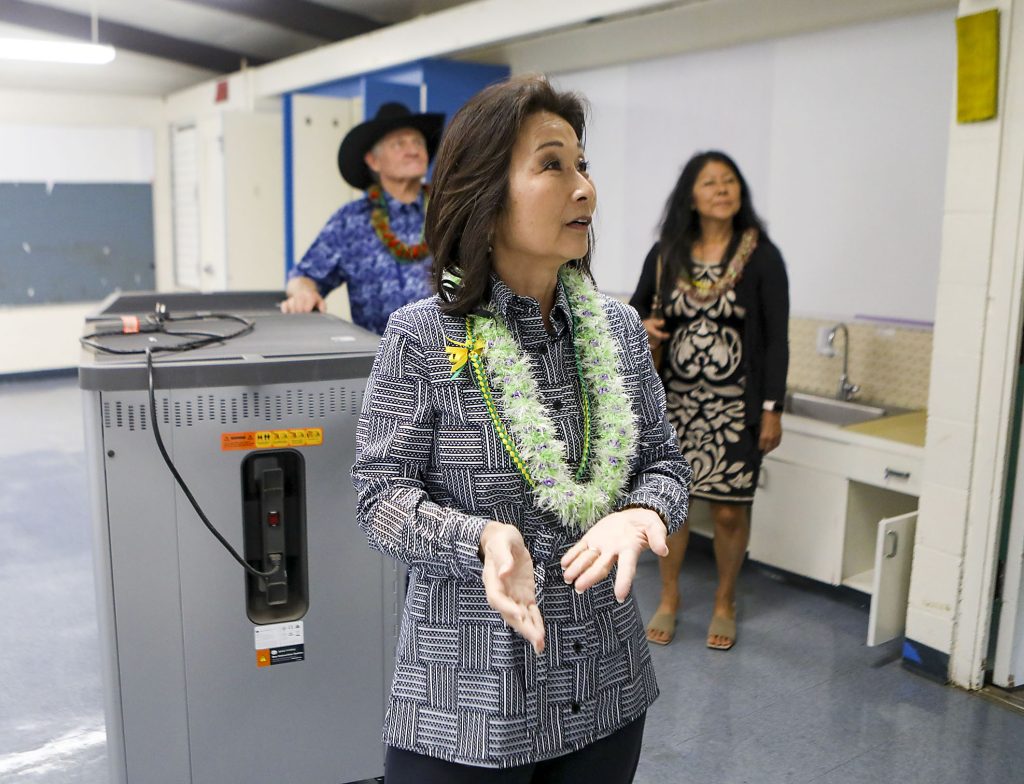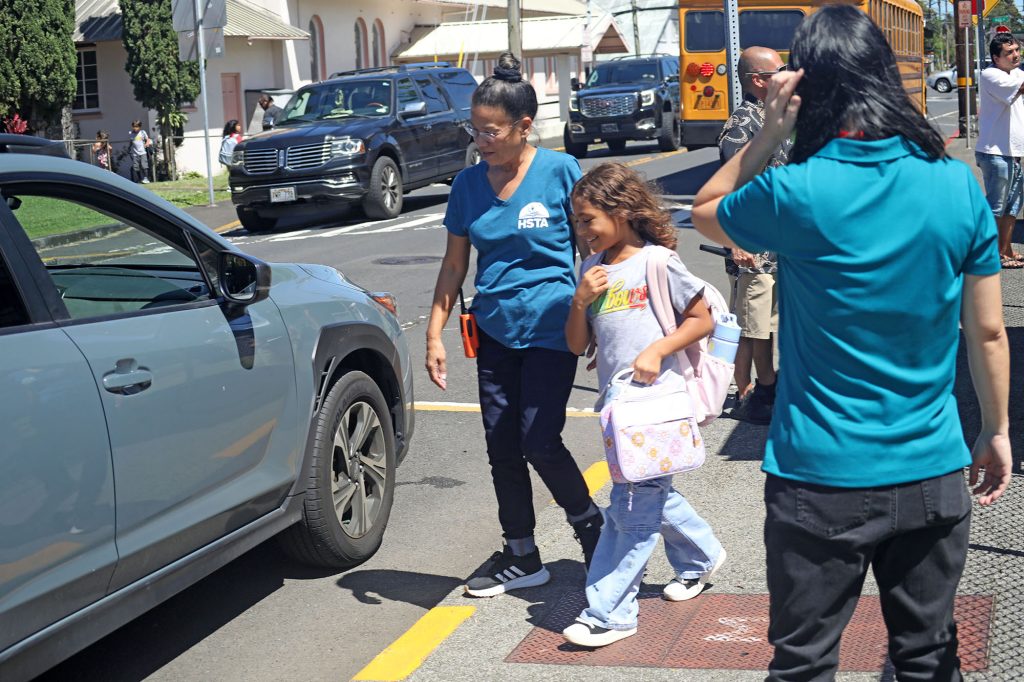State expands accessible early childhood education opportunities statewide
After the bell rang at 2:10 p.m. on Tuesday, 4-year-old preschoolers Mauka and Makai talked with their classmates as they waited to be picked up after the first day of school at Chiefess Kapiʻolani Elementary School in Hilo.
Although the twins attended preschool the year before, this is the first time they are at the same school, and it was a great day, according to their mother, Meghan Cowdrey-Demetrion. The boys got to eat lunch together and meet some new friends.
“They were just so excited to be able to go to the same school together,” Cowdrey-Demetrion said. “We celebrated a great first day of school by spending the afternoon at Puhi Bay.”
Mauka and Makai are participating in the Hawai‘i Department of Education’s Executive Office of Early Learning Public Prekindergarten Program, which is free for eligible families. The program currently operates in Department of Education classrooms on select campuses across all the islands and in some classrooms at Hawaiian language immersion schools.

Hawaiʻi Lt. Gov. Sylvia Luke’s Ready Keiki Initiative has led to legislation that has increased funding for early childhood education, growing the number of public school prekindergarten classrooms from 54 to 88 statewide since 2022.
Ready Keiki is a multi-faceted plan to provide access to preschool for Hawai‘i’s 3- and 4-year-old keiki by increasing the number of available preschool seats across the islands and expanding eligibility to reach more families in need of support.
“The state is helping parents and kids by meeting this need in a meaningful way, and we’re so grateful that Hawai‘i is stepping up,” said Kathleen McGilvray, CEO of YWCA Preschool. “These resources and programs can help parents, but more importantly, they will positively affect children. Everyone wants the next generation to be educated and have everything they need in their toolbox.”
On Kauaʻi, there are five schools that offer the public preschool classes through the Executive Office of Early Learning, including one new school – King Kaumuali’i Elementary in Līhuʻe.
This new class is one of 25 new preschool classes that are set to start offering early childhood education across the state.
Other participating Kauaʻi elementary schools include ‘Ele’ele, Kapa’a, Kekaha, and Kīlauea.
While the program is open to all children living in Hawai‘i who are aged 3 and 4, enrollment priority is given to those who fall into certain categories, including:
- Children who are eligible for special education services under the Individuals with Disabilities Education Act
- Children who are English as a second language learners
- Children in foster care
- Children who are experiencing homelessness or unstable housing
- Families with gross family income at or below 300% of the federal poverty guidelines or receiving Temporary Assistance for Needy Families (TANF) and/or Supplemental Nutrition Assistance Program (SNAP)
- Children who are experiencing at-risk situations that may impact their learning and development
For Cowdrey-Demetrion, she was able to secure priority eligibility for Mauka and Makai since this is their second year of preschool, and they both have different individualized education programs, which detail how a student’s unique needs will be addressed to ensure they receive specialized instruction and support.
“This was quite the process in the beginning, especially with them being twins and each having different individualized education programs. It was hard not having them at the same school,” Cowdrey-Demetrion said. “We were able to get them at the same school for the first time this year, and it is so much better for them and easier for us, of course. I am grateful that they have loved school so far.”
Another program that has been expanded by the Ready Keiki Initiative is the state’s Preschool Open Doors — a Department of Human Services program that provides monthly childcare and preschool tuition subsidies for qualifying families based on their income.

In June, Luke signed Act 203 (House Bill 692) to raise the income eligibility to 500% of the federal poverty level by July 1 of this year and to expand the age of enrollment to 2-year-olds by January 2026.
For the YWCA Preschool in Hilo, the Preschool Open Doors expansion will especially help Asset Limited, Income Constrained, Employed (ALICE) families who previously fell outside the income limits but still struggled with high childcare costs.
“We really want to get the word out there no matter what preschool someone goes to; no matter where they are in the process, there are options for support,” McGilvray said. “I know some people may think they won’t qualify, but now they very well might.”
Preschool Open Doors is also making it easier for childcare providers to open family care centers and preschools, which would help increase the availability of early childhood care in more rural locations such as Hāmākua, Ka‘ū and Kohala.
Kehau Lee Hong-Mauga, a family navigator subsidy specialist with Patch Hawai‘i, has been helping families apply for Preschool Open Doors tuition assistance and training childcare providers to open their own facilities or programs.
“There is an urgent need for high-quality child care, and there are pathways for people to become family child care providers,” Hong-Mauga said. “If you are already caring for your children, you can help other families by becoming a certified provider.”
By law, anyone who cares for more than two children, not related by blood, marriage, or adoption, with or without payment, must be licensed by the state Department of Human Services. An application must be made, and each applicant and home is “studied.”
An application can be approved or denied, and a license can be revoked or suspended if conditions are considered dangerous to the children’s health, safety or welfare.
Patch Hawai‘i offers support to potential providers as they become licensed, guides them with setting up a childcare business, teaches important aspects of child development, nutrition, health and safety, and refers parents who are looking for childcare.
“Early education gives children the foundation needed for a good education, and seeing these opportunities expand is exciting,” Hong-Mauga said. “We want everyone to know that we are always here to support them through the process.”
For the 2025 to 2026 Preschool Open Doors program, children born between Aug. 1, 2020, and July 31, 2022, are still eligible to apply since the application does not close.



